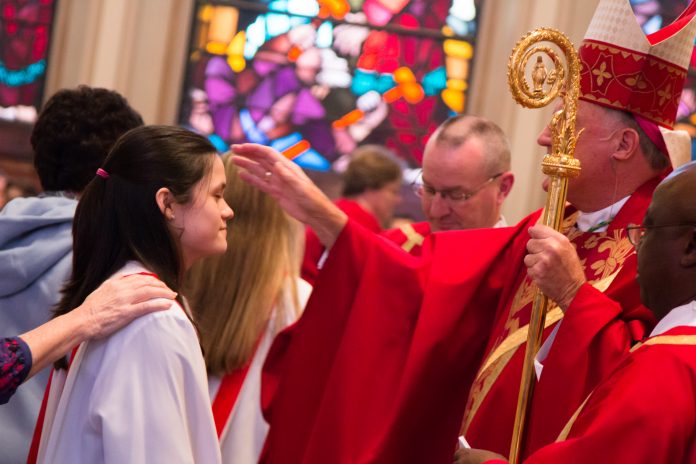
BY BISHOP ROBERT MCMANUS, DIOCESE OF WORCESTER
Pope Francis has repeatedly reminded the Church that the basis of all evangelization and catechesis is the proclamation of the apostolic kerygma. This the stunning announcement that Christ has died for the salvation of all people, and on the third day after his cruel death, God raised him to new life and exalted him as Lord; and in order to be saved, one must believe in him as the Savior of the world (see Acts 2:22-24; 36-39).
Catechists introduce the person of Jesus
The role of the catechist is to help pass on the faith of the Church by introducing students to the person of Jesus Christ. In his apostolic exhortation, Catechesi Tradendae (“Catechesis in Our Time”), St. John Paul II taught that catechesis is essentially an experience of encountering the person of Jesus within the community of faith which is the Church. Pope Emeritus Benedict XVI echoed this fundamental insight into the catechetical mission of the Church when he wrote in his first encyclical, Deus Caritas Est (“God Is Love”), “Being a Christian is not the result of an ethical choice or a lofty idea, but the encounter with an event, a person, which gives life a new horizon and a decisive direction” (DCE, 1).
In most dioceses, the sacrament of Confirmation is usually celebrated during the Easter season. This pastoral practice is commendable because for 50 days the Church proclaims with unrestrained joy that Jesus Christ is risen from the dead. The Savior is living within his Body, the Church, and calling all people to believe in him through the power of the Holy Spirit. Fortified by the gifts of the Holy Spirit, a confirmed Catholic is sent forth as a joyful and convinced witness to the Risen Christ.
Moreover, every Sunday is an occasion to celebrate in Word and Sacrament our Easter faith. Each Sunday celebration of the Eucharist is a proclamation of the Paschal Mystery and a liturgical invitation to the faithful to enter sacramentally into the death and resurrection of Christ. By doing so, Christians can grow in holiness of life and deepen their commitment to becoming missionary disciples through the worthy reception of the Body and Blood of Christ.
The Church depends on the Eucharist
A common lament among parish priests is the precipitous decline in the number of Catholics who attend Mass every Sunday. This is a major pastoral crisis that cannot be ignored or minimized. In one of his last magisterial documents, Ecclesia de Eucharistia (“On the Eucharist in its Relationship to the Church”), St. John Paul II emphasized that the very existence of the Church depends on the celebration of the Eucharist because in and through the reception of the Holy Eucharist, an individual believer’s faith and personal relationship with the Risen Christ are enriched. Moreover, in and through that more intimate belonging to the Eucharistic Lord, the relationship of all the members of the Church to each other is deepened and strengthened.
This most unfortunate decline in regular Mass attendance among American Catholics has had a deleterious influence on the ability to catechize our youth well. It is a widely documented pastoral reality that the parents’ practice of the faith, particularly in the matter of regular Mass attendance, has a major effect on their children’s practice of attending Mass each Sunday. Priests and catechists sadly report that parents who bring their children to catechetical instruction on a Sunday morning will often not attend Mass with their children before or after class.
The Second Vatican Council referred to the family as “the domestic church” (LG, 11). In the celebration of the sacrament of Baptism, the priest or deacon reminds the father of the child being baptized that “the father and mother will be the first teachers of their child in the ways of faith. May they be also the best of teachers, bearing witness to the faith by what they say and do.” These theological truths cannot be lived out in a family where regular attendance at Sunday Mass is not a weekly family practice.
Every celebration of the Eucharist is a proclamation of the apostolic kerygma and a privileged opportunity to encounter personally the Risen Christ, especially through the reception of Holy Communion. At the same time, the celebration of the Eucharist is also a profoundly catechetical event. In the Liturgy of the Word, we hear proclaimed the mirabilia Dei, “the wonderful works of God” that constitute the history of salvation. Beginning with creation and stretching through the history of Israel to the death and resurrection of Christ, the outpouring of the Holy Spirit, and the growth of the Church, the Christian faithful hear weekly of the mysteries of the Catholic faith.
In the Liturgy of the Eucharist, by the power of the Holy Spirit and the ministry of the priest, the very action of our redemption is made sacramentally present on the altar and then made available as “food for the journey” to feed those who have been invited to the Supper of the Lamb. When our young people do not attend weekly Sunday Mass, they are deprived of a singular opportunity not only to be catechized but also to be transferred spiritually into a more profound relationship of love with the One whose name it is their privilege to bear as Christians.
Catechesis is a crucial ministry of witness
There is a venerable scholastic axiom that teaches, “You cannot give what you do not have.” The ministry of the catechist is a crucial ministry in the pastoral life of every parish. There is much that a catechist can do in preparing oneself theologically for participating competently and confidently in the Church’s ministry of handing on the faith. However, there is no better spiritual preparation for the catechetical task than to cultivate a deep appreciation and love for the Holy Eucharist. It is in the Eucharist where the catechist will encounter the Lord Jesus and grow steadily in her or his own love relationship with the Divine Teacher.
Blessed Pope Paul VI once noted that people listen “more willingly to witnesses than to teachers, and if [they do] listen to teachers, it is because they are witnesses” (Evangelii Nuntiandi, 41). This Easter season, let us strive with God’s abundant grace to be true witnesses to the resurrection of the Lord in the earnest hope that we will be able to introduce him and the joy of his Gospel to those whom we teach and serve.
Most Reverend Robert J. McManus is the fifth Bishop of Worcester, Massachusetts. Ordained as a priest in 1978, Pope John Paul II elevated him as an Auxiliary Bishop of Providence in 1999. He was later installed as Bishop in Worcester on May 14, 2004.
This article is originally published in Catechist, March 2017.
Image credit: Michael Doyle/Bayard Inc.




